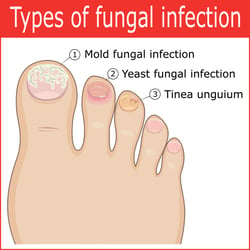Know The Symptoms And Reasons You Shouldn't Wait to Seek Effective Treatment
A painful, thick, yellow, green, brown or black toenail means you could have a toenail fungus infection. If you have a toenail fungal infection it won't go away on its own. You can't get rid of it with home remedies or over the counter topical treatments. Learn why, and how to cure it by reading more.
 Toenail fungus is common and it can develop when dry, brittle nails develop cracks that allow fungus to enter the nail unit. A toenail fungus infection most often occurs when excessive moisture gets under your toenail and is trapped by your socks and shoes, allowing fungus to grow and thrive. Nail fungus can also be caused by yeast and mold.
Toenail fungus is common and it can develop when dry, brittle nails develop cracks that allow fungus to enter the nail unit. A toenail fungus infection most often occurs when excessive moisture gets under your toenail and is trapped by your socks and shoes, allowing fungus to grow and thrive. Nail fungus can also be caused by yeast and mold.
Left untreated toenail fungus can become a foot fungus, spreading from your toenail, to the skin in between your toes, your arch and the heel of your foot.
Scratching it or picking at it can also spread it to your fingers, and then to other parts of your body. You can also spread it to other people if you are sharing a shower or tub.
Signs and Symptoms of Fungal Infection
- Thickening of the nail

- Discoloration of the nail
- Debris under the nail
- Throbbing toe pain
- Lifting of the nail
- Splitting of the nail
- Crumbling of the nail
- Deformation, jagged edges of the nail
- Yeast infections of the nail will have a foul odor
Toenail Fungus Treatment
Once a fungal infection is in your toenail your body's immune system can't fight it on its own because the infection isn't inside of your body, it's setting on top, on your toenail. Your body's immune system doesn't know to fight it. So waiting for it to go away, or fade away, on it's own isn't going to work for you.
Toenail fungus is a common primary care podiatric condition and can be treated conservatively in the office setting with a minor surgical procedure (if the nail needs to be removed) under local anesthetic or with medication.
You get rid of toe nail fungus when it is treated with a prescription anti-fungal medication, nail avulsion (surgically removing the nail or a portion of the nail), or both. Over the counter treatments for nail fungus won't kill it because these type of topical treatments for toenail fungus don't penetrate the nail plate. The thick, fungal debris caused by this type of infection needs to be trimmed back or surgically avulsed before a topical medication has a chance of helping.
To be certain that your condition is in fact a toenail fungal infection, and to ensure effective treatment is ordered, the first step you should expect your physician to take is to order PCR genetic fungal pathogen testing.
A PCR genetic fungal pathogen test will identify the specific organism (fungal, yeast or mold) that is infecting the nail unit so that your podiatrist can determine the most appropriate treatment course, oral or topical, and what type of anti-fungal prescription medication will work best. Sometimes a prescription topical medication will work for a superficial yeast infection but most of the time, in order to get penetration of the nail unit, an oral anti-fungal agent is required.
Certain mold infections require the nail to be taken off to allow healthy regrowth from the nail matrix in combination with a prescription topical or oral anti-fungal medication.
A prescription strength, anti-fungal medication kills the fungus by depositing Terbinafine, or Itraconazole, in the nail as the nail is being produced by the matrix. Terbinafine works by decreasing the ability of fungi to make sterols, or the organic molecules of the fungus, resulting in fungal cell death. Itraconazole stops fungal growth by affecting the cell membrane or affecting cell metabolism. In either case, the prescribed medication creates a chemical barrier so that new nail can grow out healthy, pushing your old fungal nail to the end of your toenail where it can be trimmed or filed off.
Medical Complications From Untreated Fungal Toenail Infection
Without proper treatment to stop your toenail fungal infection from getting worse, or spreading, complications will eventually develop. Fungal infections of your toenail can spread to the surrounding skin and when your skin becomes cracked, bacteria can enter and cause an abscess.
An abscess on the toe is a tender mass generally surrounded by a colored area from pink to deep red. They are often easy to feel by touching. Inside they are full of pus, bacteria and debris.
Untreated toenail fungal infections can lead to cellulitis (a bacterial infection with symptoms of red, swollen, tender skin) and should be treated immediately with antibiotics. Untreated skin infections of the toe may lead to severe cellulitis and if the infection enters the bloodstream it can become septicemia, also known as bacteremia or blood poisoning. Once the infection enters the bloodstream the bacteria and their toxins are carried through the bloodstream to your entire body. If the bacteria levels become high enough, septicemia can quickly become life threatening.
A good reason to seek treatment if you suspect you have a toenail fungal infection is because of the similarity of symptoms for differing diagnosis of more serious toenail conditions. You may have a toenail fungus, but you could also be experiencing similar symptoms of a toenail viral infection (a subungal verruca or wart below the nail), complications from toenail trauma, a pre-malignant lesion or, more seriously, melanoma (cancer) of the nail bed.
If you experience any of the symptoms listed above see a foot specialist who diagnoses and treats these conditions frequently. Stop its growth and avoid potential complications from leaving it untreated.


